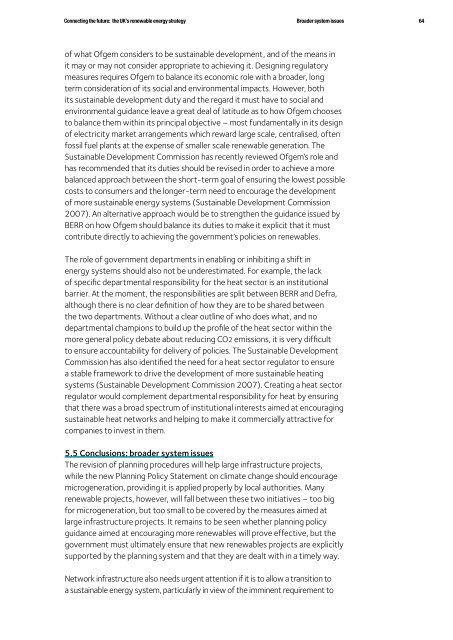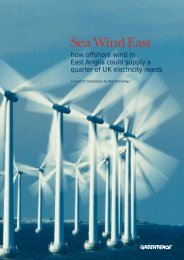Connecting the Future - Greenpeace UK
Connecting the Future - Greenpeace UK
Connecting the Future - Greenpeace UK
You also want an ePaper? Increase the reach of your titles
YUMPU automatically turns print PDFs into web optimized ePapers that Google loves.
<strong>Connecting</strong> <strong>the</strong> future: <strong>the</strong> <strong>UK</strong>’s renewable energy strategy<br />
Broader system issues<br />
64<br />
of what Ofgem considers to be sustainable development, and of <strong>the</strong> means in<br />
it may or may not consider appropriate to achieving it. Designing regulatory<br />
measures requires Ofgem to balance its economic role with a broader, long<br />
term consideration of its social and environmental impacts. However, both<br />
its sustainable development duty and <strong>the</strong> regard it must have to social and<br />
environmental guidance leave a great deal of latitude as to how Ofgem chooses<br />
to balance <strong>the</strong>m within its principal objective – most fundamentally in its design<br />
of electricity market arrangements which reward large scale, centralised, often<br />
fossil fuel plants at <strong>the</strong> expense of smaller scale renewable generation. The<br />
Sustainable Development Commission has recently reviewed Ofgem’s role and<br />
has recommended that its duties should be revised in order to achieve a more<br />
balanced approach between <strong>the</strong> short-term goal of ensuring <strong>the</strong> lowest possible<br />
costs to consumers and <strong>the</strong> longer-term need to encourage <strong>the</strong> development<br />
of more sustainable energy systems (Sustainable Development Commission<br />
2007). An alternative approach would be to streng<strong>the</strong>n <strong>the</strong> guidance issued by<br />
BERR on how Ofgem should balance its duties to make it explicit that it must<br />
contribute directly to achieving <strong>the</strong> government’s policies on renewables.<br />
The role of government departments in enabling or inhibiting a shift in<br />
energy systems should also not be underestimated. For example, <strong>the</strong> lack<br />
of specific departmental responsibility for <strong>the</strong> heat sector is an institutional<br />
barrier. At <strong>the</strong> moment, <strong>the</strong> responsibilities are split between BERR and Defra,<br />
although <strong>the</strong>re is no clear definition of how <strong>the</strong>y are to be shared between<br />
<strong>the</strong> two departments. Without a clear outline of who does what, and no<br />
departmental champions to build up <strong>the</strong> profile of <strong>the</strong> heat sector within <strong>the</strong><br />
more general policy debate about reducing CO2 emissions, it is very difficult<br />
to ensure accountability for delivery of policies. The Sustainable Development<br />
Commission has also identified <strong>the</strong> need for a heat sector regulator to ensure<br />
a stable framework to drive <strong>the</strong> development of more sustainable heating<br />
systems (Sustainable Development Commission 2007). Creating a heat sector<br />
regulator would complement departmental responsibility for heat by ensuring<br />
that <strong>the</strong>re was a broad spectrum of institutional interests aimed at encouraging<br />
sustainable heat networks and helping to make it commercially attractive for<br />
companies to invest in <strong>the</strong>m.<br />
5.5 Conclusions: broader system issues<br />
The revision of planning procedures will help large infrastructure projects,<br />
while <strong>the</strong> new Planning Policy Statement on climate change should encourage<br />
microgeneration, providing it is applied properly by local authorities. Many<br />
renewable projects, however, will fall between <strong>the</strong>se two initiatives – too big<br />
for microgeneration, but too small to be covered by <strong>the</strong> measures aimed at<br />
large infrastructure projects. It remains to be seen whe<strong>the</strong>r planning policy<br />
guidance aimed at encouraging more renewables will prove effective, but <strong>the</strong><br />
government must ultimately ensure that new renewables projects are explicitly<br />
supported by <strong>the</strong> planning system and that <strong>the</strong>y are dealt with in a timely way.<br />
Network infrastructure also needs urgent attention if it is to allow a transition to<br />
a sustainable energy system, particularly in view of <strong>the</strong> imminent requirement to




![[2007] EWHC 311 - Greenpeace UK](https://img.yumpu.com/22079793/1/184x260/2007-ewhc-311-greenpeace-uk.jpg?quality=85)











